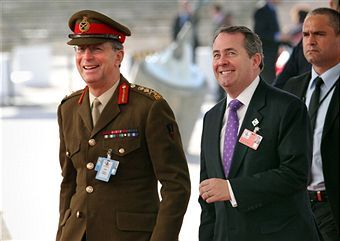 The Ministry of Defence is one of Whitehall’s largest and most dysfunctional departments; and it has long resisted effective reform. However,
the parlous public finances dictate that reform take place. 8 per cent Budget cuts have to be delivered, while attempting to bring a £36bn black hole under control.
The Ministry of Defence is one of Whitehall’s largest and most dysfunctional departments; and it has long resisted effective reform. However,
the parlous public finances dictate that reform take place. 8 per cent Budget cuts have to be delivered, while attempting to bring a £36bn black hole under control.
Strategic retrenchment aside, efficiency is Liam Fox’s most potent weapon. To that end, Lord Levene has conducted an examination into departmental structures. Levene reports that the MoD’s maze of committees and sub-committees should be ripped-up to improve decision making and save money (and perhaps one of the ministry’s five ministers of state). ‘Sound financial management,’ he says ‘must be at the heart of what the MoD does.’
Administrative streamlining will also be applied to the services. First, the number of senior officers retained by the MoD will be reduced, but only in line with 17,000 personnel reductions being made to the services as a whole over the next four years. Senior officers will therefore remain perhaps too significant as a proportion of personnel as a whole. To counter that, Levene suggests that a joint command be introduced, where the service arms are represented by one officer. Currently, each service is represented by two officers of equal rank; one who is responsible for long-term strategy, the other for day-to-day operations. This has led to spectacular procurement failures in the past: for instance, at the time of the Strategic Defence Review, the navy was split into two camps: one that favoured a ‘blue-water strategy’ centred on super-carriers, the other favoured a strategy based on smaller and more numerous ships, which demanded that much of Britain’s current fleet be retained for the time being. The intervention in Libya suggests which of those strategies was more suitable to Britain’s likely commitments.
By uniting the services under one joint command and uprooting the obstructive nest of committees, the Secretary of State will be able to manage projects more carefully, which should lessen expensive procurement crises as the MoD prepares to take long-term decisions as the drawdown from Afghanistan begins. There will be some who resist change: both senior officers and MoD officials, both of whom will have their wings clipped. Equally, the most liberal economists might argue that these reforms do not go far enough: difficulties will never be overcome unless procurement is opened up to the international defence market, which will reduce price and encourage greater scrutiny of decisions. But, Levene’s report will make some impact on the dangerous ‘conspiracy of optimism’ that has governed Britain’s defence establishment.






Comments